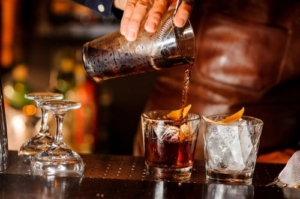
 Controlling the beverage cost is a big deal in hotels. People like to drink and that’s great for the bar, but you have to remember the people serving your drinks need a tight set of checks and balances or else they will help themselves to your supplies. It’s just human nature to mess around with the stuff at your fingertips all day long. There is a certain sense of entitlement as well because the wages are small, and people rely on tips. Bigger portions or the odd free one for a client can make a big difference in the tips left behind.
Controlling the beverage cost is a big deal in hotels. People like to drink and that’s great for the bar, but you have to remember the people serving your drinks need a tight set of checks and balances or else they will help themselves to your supplies. It’s just human nature to mess around with the stuff at your fingertips all day long. There is a certain sense of entitlement as well because the wages are small, and people rely on tips. Bigger portions or the odd free one for a client can make a big difference in the tips left behind.
Now, I’m not saying your beverage staff are stealing or anything like that but what I am saying and what this piece is all about: Have a tight set of controls that you continuously monitor and you will help the honest people stay that way, and you will minimize the mischievous. Hotels have some special nuances with multiple outlets and the stuff quite literally everywhere.
Working the dining room and the bars in the early part of my career, plus a generous stint as an F&B Cost Controller, I learned a thing or two and it’s not rocket science. Rather, it is just good housekeeping and common sense. But like anything, if you don’t practice it won’t take care of itself. Put these controls in place and ensure they are followed every day and you will keep more of what’s yours.
Most of these controls work together to create a system you can utilize to organize your team’s efforts and make the process of providing and selling alcohol in your hotel as efficient as possible:
- Point of sale first. Simply put, all sales must be recorded in the POS first. No ticket no beverage. This ensures that the people on the floor must properly record the sale before the bartender makes the drink order. This separation of duty is critical for ensuring your waitstaff cannot get drink items prepared without first properly recording the sale. Skip this and you are wide open.
This also is an easy control to monitor, simply watch what’s happening. Did Paul go from the customer’s table to the POS and then to the bar? Did Susan grab the chit from the printer before she made the order for Paul? - Measuring devices. All items dispensed must have a portion controlling device. One of the best examples of this that already exists is bottled and draft beer. When we serve one of these it’s already in the proper portion. A full glass of draft is what we expect and, other than over pours and foam, it is perfect. The same goes for the bottled beer. But spirits and wine are a different story. Ideally you want a computerized dispensing system for your spirits and house wine.
Today there are some excellent examples that have technology that allows you to measure individual staff performance relative to the portion size poured vs. the standard. With these systems you can reduce the over pouring by 2-4 percentage points of liquor or wine cost. A million dollars in liquor sales at a 20 percent cost when it really should be 17 percent is equal to $30,000 and it’s an even greater cost with wine. But even without an automated system you need to use measuring devices such as jiggers for your alcohol and carafes for your wine. - Voids and adjustments. Closely controlling who has the authority to process credits inside your POS is a fundamental control point however, it’s often overlooked for efficiency. If a staff member that’s serving your guests has the ability to adjust off the sale without someone else’s approval, then you are wide open for fun and games to be played.
- The need for a separate main beverage storeroom. In hotels we have multiple outlets and we want to ensure we control the inventory with a central distribution and location. In this case it’s obvious that volume matters and you will want to ensure you have enough but don’t assume you can take a shortcut. Without a central storeroom and someone managing the inventory and its distribution you are not going to be able to establish sufficient control.
- Separate ordering, approval and receiving. Separating the functions and the people that perform these is critical. In full-service hotels the order should be prepared by the storeroom staff based on their minimum/maximum par stock for the storeroom as well as the special banquet wine requirements. The order then must be approved by the F&B or Operations Manager. Once approved the order is placed by the storeroom clerk and when it’s delivered or picked up, depending upon the set up, it must be verified by the hotel receiver.
Someone must verify the order received that’s independent to the storeroom and the operation. Someone who reports to the financial department is ideal. Create the same separation for your food and all other operating supplies for all departments. - Outlet Par Stocks. Establishing individual outlet par stocks for Liquor, Beer and Wine ensures that you have an inventory framework in which to work. The par stocks should be set up for all outlets except for Banquets. Banquet volumes and customer specific events preclude the par stock practicality for banquets.
For the rest of your outlets it’s how many bottles of each item that there should be on hand, full or empty. This system allows you to know the maximum dollar value of inventory on hand for each outlet. This is very helpful when it comes time for inventory to know what the expected range of the dollar value of inventory is as well as how many bottles of each individual item you expect to count. - Liquor and wine bottle stickers. With an established individual par stock for each outlet, the next part of the system is stickers. From the storeroom all liquor and wine products require stickers to be affixed to each bottle and a different color sticker is to be used for each outlet. Take the time to set this up. Order your stickers so they are sequentially numbered and make sure you have a constant supply. This will cost you a few hundred dollars per year, but they are worth their weight in gold.
Why? When you spot check a bar or do your inventory, every sticker should be the same color. This ensure the products you have issued end up in the right bar. This also ensures staff can’t bring in their own bottles. If they do, they won’t have the proper sticker. Keep an eye on the trash with this control as a bottle in the garbage without a sticker is a smoking gun. - Requisitions. Require the use of requisitions for absolutely everything issued to all outlets. Use different requisitions for each outlet based on the individual par stock. Have these requisitions pre-printed and sequentially numbered. Part of the closing duties is to submit a daily requisition for all items required to bring the bar back to its part stock.
- Bottle for bottle exchange. Part of the opening duties for each bar is the retrieval of the order placed the prior evening at the end of the shift. Part of the receiving of the order from the storeroom is the exchange of the empty bottle for a full one. The storeroom clerk must ensure all stickers match the outlet’s color and all empty bottles are counted and add up to the requested order. The final step is to deface the sticker so it cannot be used again.
The bottle-for-bottle exchange is critical for maintaining the par stock and ensuring the outlet has the proper supplies to meet the business and customer requirements. - Transfer slips. Beverages need to move around your hotel in order to ensure your par stocks are efficient and not too high. With multiple outlets and expensive slow-moving items like liquors and fine spirits you will want to only have one bottle on hand in the key outlets. When the bar runs out of one of these items and the customer wants more, they need the ability to transfer stock form one outlet to the other.
I could go on forever it seems. Look for Part 2 soon. Until then look at your setup and ask yourself how well you are doing? If you see opportunities to introduce these types of controls, then you need to get cracking. Without this framework evaporation is certain!
At Hotel Financial Coach I help hotel leaders with financial leadership coaching and workshops. Learning and applying the necessary financial leadership skills is the fast track to greater career success and increased personal prosperity. I significantly improve individual and team results with a proven return on investment.
Click on the image above to learn more about my video course.
Be sure to check out my other services on the links below.
The 3 Month 1-1 Financial Leadership Mentoring Program
Strategic Hospitality Financial Leadership Workshops
415 696 9593 – Cell or Text
Read a Story About How I Helped a Client
Give the coach a call today and let’s get going!
If you would like a copy of the following send me an email at
- A White Paper – Creating a Hotel Policy Manual
Visit my website today for a copy of my FREE guidebook
The Seven Secrets to Create a Financially Engaged Leadership Team in Your Hotel
www.hotelfinancialcoach.com

